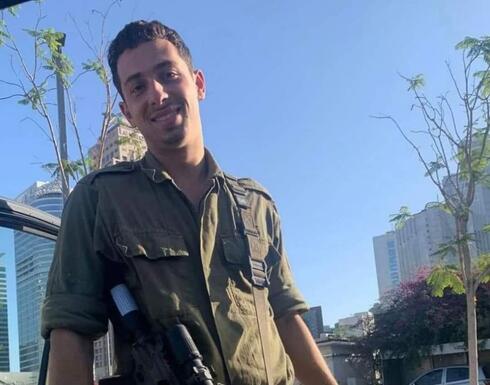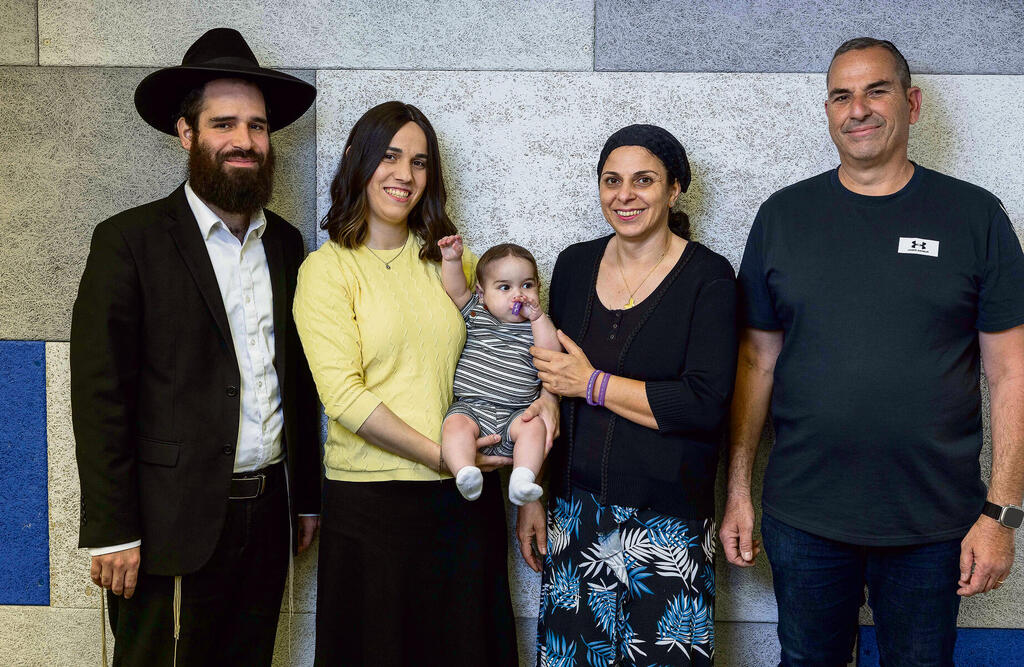JERUSALEM (VINnews) — In a poignant story of heroism, sacrifice and unity, the families of a fallen soldier and a baby who received his liver have become very close, and the mother of the soldier is now viewed as a “grandmother” of the baby, according to a Ynet report.
Join our WhatsApp groupSubscribe to our Daily Roundup Email
The late Staff Sergeant Ori Gerby was killed in January in Khan Younis. Right before his funeral, his mother received a call from the transplantation center, informing her that her son’s liver saved the life of a seven-month-old baby suffering from a rare liver disease.

Ori Jerby z’l
“Ori’s funeral was on Friday at 11:00 in the morning,” Naomi recounted to Ynet. “20 minutes before the funeral, they called me from Soroka and told me that Ori’s liver saved the life of a seven-month-old baby. I remember telling everyone excitedly. Even at that moment, it gave us comfort when we had to say goodbye to our Ori. And there was another girl who received a kidney a few weeks later.”
“I feel like Itzik is really Ori. We were so excited at our first meeting with him. When his parents came in, I reached out to Itzik, he put his head on me, caressed my face, and held my finger tightly. Such a little baby. I asked that the meeting be around Ori’s birthday, and that’s what happened. I was afraid to drop him out of too much excitement, so I gave him to my husband’s parents, and there was even more love there,” she said.
“He really talked to me with his eyes,” Ori’s father Hagai said, tears welling up in his eyes. “His grandfather told us that he’s not ready to go to anyone since the difficult tests and surgeries he underwent, because he associates every stranger with painful things, and we were the first strangers he opened up to like that. He felt who we are, and we felt Ori coming out of him.”
The two families met at the Kfar Maccabiah Hotel, and fussed over baby Itzik who was sucking on a purple Givati bracelet in honor of the late Staff Sergeant Ori Gerby. The bracelet says: “Spreading the light of Sgt. Ori Gerby, hero of Israel.”
“Ori came after many years of treatment,” Naomi said. “And after him came Yuval, who is 18 years old. Hagi and I own a family vegetable store in Bnei Brak, we’ve been working together for four years. It helps us get through these tough days. We’re a traditional family, not religious,” Naomi specified, dressed modestly for the meeting. Hagi also wore a kippah, although he doesn’t wear one on a daily basis.
“Ori was a special child and had an inner light that radiated outward. I always felt that he was a gift for a short time. When the war broke out, I felt that he wouldn’t come back. He was a competitive tennis player, an athlete, and he left tennis behind to enlist in the army. He aspired to reach as far as possible,” Naomi said.
Hagi said that “He wanted to serve in Sayeret Matkal (special commando unity) and ended up in the Givati brigade. He was admired by everyone and his commanders said they would follow him into battle. It’s hard for us to say ‘was,’ it’s still not believable. Ori was the first grandson on Naomi’s side of the family. He loved animals, the safari in Ramat Gan was his second home. Smart, he could do anything he wanted in this life.”
Naomi says that her son “served as a sniper, went into every place. A child who volunteered for every task. Even for the mission he was killed in with the late Staff Sergeant Oriya Ayimalk Goshen, may he rest in peace, they both volunteered to go up to the third floor and sweep it while the rest of the team was on the first floor. They were killed by an RPG.”
Ori arrived in Soroka Hospital in critical condition, with a head injury requiring full facial bandaging. The family brought a large picture of Ori so that the doctors could see the life they were fighting for. The picture had the caption, “One day I will invite you all to play basketball,” something that did not happen.
“Ori came in with severe injuries to the head and eyes,” Naomi said, her eyes welling with tears. “We thought he would get through this because he was a fighter, physically strong, tall, resilient. We truly believed he would get through this. All the time we spoke to him, and I told him: ‘Ori, you have to come back, we’re waiting for you.’ We played him songs he loved, and friends surrounded him. The doctors told us that his life was in danger, but we spoke among ourselves that he would get through this, and when he returns, he will be on the ground floor during his rehabilitation.”
Naomi: “I really thought he would wake up. I sent Hagi and everyone home on Wednesday because I felt everything was okay. I put it like this. In the early morning, the nurse told me to rest a bit after 24 hours without sleep. I went out for an hour and in the meantime, the staff changed. I told them ‘good morning, today there will be good news,’ and I went into Ori’s room when the monitor started acting up. We thought something had gone wrong. The doctor came in, saw the monitor, and told me that Ori was brain dead. I was in total shock. It was early morning, and dozens of people had already arrived. Everyone was praying. And I knew that Ori had passed away, and I didn’t want to say anything until my husband arrived.
“The transplant coordinator from Soroka came in and told us about organ donation. I remembered that when Ori was little, I found an organ donor card on him, and when we talked about it, he said to me: ‘Mom, if something happens to me, I really want you to donate my organs.’ I told him: ‘Don’t talk nonsense. Nothing will happen to you.’ When Hagi arrived, I was already determined to donate.
“I have a younger cousin who is ill with a serious illness and received a lung and heart transplant and lives a normal life, got married, and had three children. Seeing the life that such a donation gives is so powerful. Ori always thought about everyone. He jumped into action on October 7 with his friends, drove to the kibbutzim, and saved so many lives.”
“He also saved the life of a six-year-old girl whom we haven’t met yet, only her mother. And this family from Bnei Brak, whom I’ve met a few times, but every time we see them we’re excited as if it were the first time. We met everyone, the parents, the grandparents. We’re family. Ori’s motto was: you live every day, but die once.”
In a miraculous way, every time someone in the room sheds tears of excitement, Itzik starts shouting words in baby gibberish. And these words cause even the saddest moment to end in rolling laughter. After all, it’s hard to remain indifferent to the baby, who came back to life the moment a soldier departed, forever remaining the baby of another mother.
“Itzik is our sixth child, born ten months ago,” Sarah Kloizner recounted. “He was a baby like any other baby until at some point, when he was three weeks old, he started screaming all the time, all day long. I took him to the doctor, mother’s intuition, and there they discovered he has a rare liver disease that develops during pregnancy and after birth. He had surgery at seven weeks old, was hospitalized for a month. They said that 20 percent get by with this surgery and don’t need a transplant.
“They told us that every time he has a slight fever, to go to the hospital. It came to a point where we were more at the hospital than at home. He had a fever and jaundice all the time. We were a broken family. My husband Yanki was with the kids, and I was in the hospital. It wasn’t a normal life. On Simchat Torah Eve, he had a fever, I traveled with him in an ambulance. All the tests showed that his condition was worsening. A baby crying all the time,” she added.
“When he was six months old, the doctors asked us to consider a transplant. They said it could take a month or a half a year, there’s a super long waiting list, in babies there’s almost no match, and it’s important that we also get tested. We asked if there were more transplants during the war and they said no. For babies, they need specific matching. We were discharged and after three days his fever went up again. This time it was a crisis for us, a downfall.”
“They told us that’s it, we need a donation from one of the parents because the condition is dangerous, and we need to start testing today. It was an incredibly tough day for all of us, we started thinking about what we would do with the other children, five of them, when Yanki and I would be at the hospital all the time. For the donor, it’s also not a simple surgery, much more difficult,” she said.
Yanki: “A minute after they informed me that I need to go in for surgery, when I lay on the bed and cried, they arranged the match with the Gerby family at Soroka. I was supposed to go into surgery and then they said there’s a donor. We were so shocked. It was a storm of emotions. I prayed like on Yom Kippur, cried for half an hour.”
Sarah: “I was in a cab to the hospital and I was screaming. What donor? They said there’s no chance. I didn’t believe it.”

The Kloizners, Itzik and the Gerby family
The Gerby family and the Kloizner family have become one family. As they are traditional and religious, would probably never have met under any other circumstances. “Ori gave us not one gift, but three,” Yanki continued, his voice choked with emotion. “One, he gave life to Itzik, saved him. Two, the role of the liver is to produce and filter blood. Ori, who gave his liver to Itzik, in fact gave him blood. Itzik continues him. Three, he saved our whole family, which was broken. Three gifts. We thought about how we need to thank them, but since we met them, they make us feel like we’re giving them something.”
Naomi says that “Parents’ selflessness is giving everything to their child like we would want to give to our child so he can live. This is something you can’t remain indifferent to. It’s moving. And it makes us understand what a good decision we made when we donated Ori’s organs. They never gave up for a moment on their child.”
Naomi: “There’s so much comfort in the fact that Ori gave life to someone else. We feel it and see it. We see Itzik growing, developing, and progressing, and it’s a huge thing for us. We feel that Ori with his shining personality, who said to me, ‘Mom, I want to donate if something happens to me,’ made a miracle. The miracle is that our tall Ori’s liver, suited such a small baby. It’s something crazy. The first time we met them, we couldn’t stop crying. It felt natural to us as if all our lives we were one family, together, and now we’ve connected again.”

